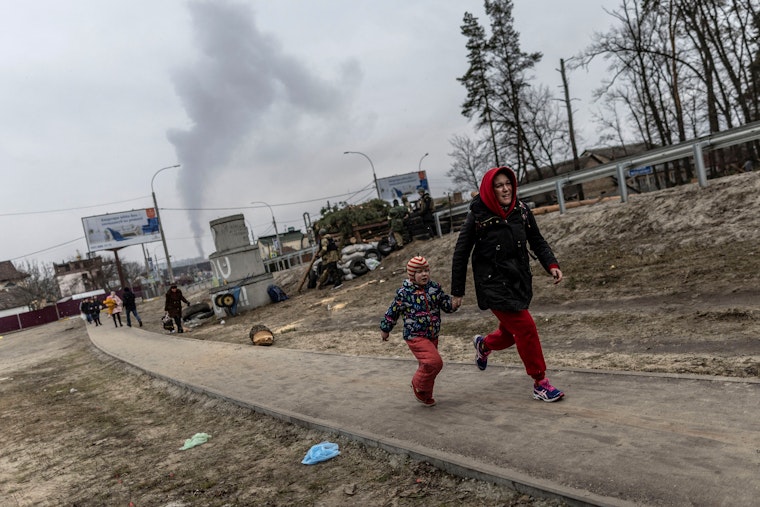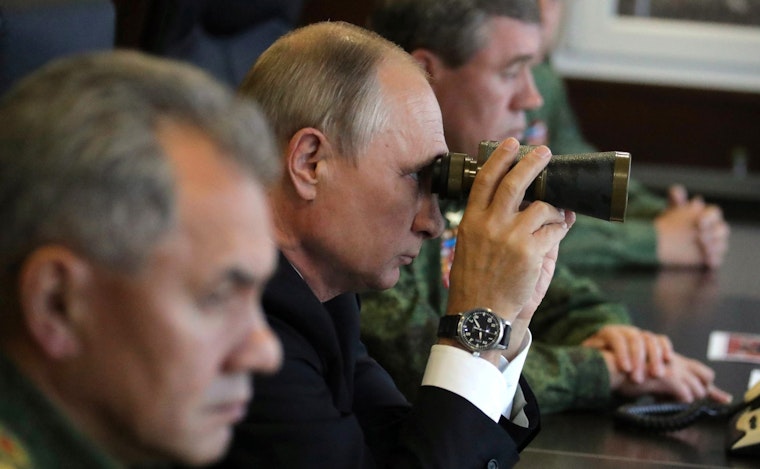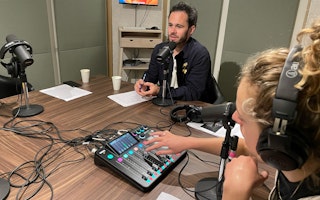Q&A: How Putin Could Be Put on Trial for the Crime of Aggression

The Open Society Foundations have supported global efforts to strengthen international criminal justice since the early 1990s, when former president Aryeh Neier pushed for the creation of the International Criminal Tribunal for the Former Yugoslavia. Today, Open Society supports local and international efforts toward accountability for atrocities committed in Ukraine. A key objective is the prosecution of Russia’s President Vladimir Putin for the crime of aggression. James A. Goldston, executive director of the Open Society Justice Initiative, explains.
In 1946, the Nuremberg Military Tribunal convicted Nazi leaders of war crimes, crimes against humanity, and crimes against peace, which included “the planning, preparation, initiation or waging of a war of aggression, or a war in violation of international treaties, agreements or assurances.” The Tribunal considered the crime of aggression “the supreme international crime, differing only from other war crimes in that it contains within itself the accumulated evil of the whole.” Since the 1940s, no national leader has been prosecuted before the courts of another state or an international court for the crime of aggression.
The International Criminal Court (ICC) has recognized the crime of aggression as an international crime since 2017. But the ICC can act only with the approval of the UN Security Council, over which Russia has veto power; or, alternatively, against the nationals of a state that has agreed to be subject to its jurisdiction over aggression. As of May 2022, only 43 of the ICC’s 123 state parties have accepted that jurisdiction. Neither Russia nor Ukraine is a party to the ICC. Although Ukraine has twice declared that it accepts the jurisdiction of the court for crimes committed within its territory, Russia’s status as a non-state party bars the ICC from addressing aggression in this conflict.
Why does the invasion of Ukraine require the prosecution of the crime of aggression?
Russia’s full-scale invasion of Ukraine, launched in February 2022, was manifestly unprovoked. There was no corresponding build-up of forces on the Ukrainian side nor threat of a military invasion of Russia by Ukraine. Russia’s assault is on a scale not seen in Europe since World War II. By its gravity, scale, and character, Russia’s invasion, and attempt to subjugate, Ukraine constitutes the clearest and most egregious instance of the crime of aggression in decades. It has rightly drawn unprecedented condemnation from the UN General Assembly, the Council of Europe, the European Union, and numerous individual states.
Why didn’t the international community respond similarly to other military invasions that occurred in recent years?
The global system of justice is riddled with inequalities and contradictions. It is lamentable that for decades, powerful states, including among the five permanent members of the UN Security Council, have been averse to endorsing a non-aggression principle that might one day constrain their own ability to act.
And yet, politics is the art of the possible, and the same may be true of what I hope is the progressive, if uncertain, advance of international justice. The horrors of World War II led to the recognition of crimes against humanity and genocide as an international crime. Widespread criminality in Yugoslavia and Rwanda gave us the international courts that laid the groundwork for the creation of the ICC in 1998. Several countries have pushed for years, together with non-governmental organizations, to secure the inclusion of aggression as a fourth core crime in the Rome Statute.
The invasion of Ukraine, bringing with it the specter of nuclear war in Europe, has sparked renewed awareness of the practical relevance of international law, and the opportunity to strengthen our shared global system and stamp out aggressive war. Maybe that’s idealistic. But the end of the Cold War made possible the birth of the ICC, which had long been considered a pipe dream. Now too, a shock to the body politic has opened new possibilities for norm enhancement and institution building. If carried out with professionalism and integrity, successful prosecutions of Russia’s blatant aggression may make it harder for the world to ignore accountability the next time a powerful actor overrides international rules.

What would be the basis of the case?
The crime of aggression focuses on the specific acts of those senior leaders who are, according to the Rome Statute that established the ICC, in “a position effectively to exercise control over or to direct the political or military action of a State.” Accordingly, accountability for the crime of aggression would require building a solid case against Vladimir Putin and other senior Russian officials. Such a case is eminently feasible, given publicly available evidence—particularly when compared with what will be needed to hold those officials responsible for atrocities committed by Russian forces on the ground. Though also possible, charging senior Russian leaders for war crimes or crimes against humanity will require that prosecutors rely on theories of “command” or other forms of responsibility that demonstrate linkage with the horrific atrocities the world has witnessed in recent weeks.
Where could such a trial take place?
Given the limits of the ICC’s jurisdiction, and the barriers to national prosecution of the most senior leadership on all sides posed by legal doctrines of immunity, there is currently no forum where a prosecution of aggression could be launched. But international law is made and expanded over time, and the steps being taken now on the crime of aggression are part of this process.
In Ukraine itself, for instance, national prosecutors have set up a Joint Investigations Team (JIT) with colleagues from Lithuania and Poland to investigate various crimes, including the crime of aggression. The ICC prosecutor has joined the JIT, as has the Eurojust, a European Union agency that coordinates investigations of serious cross-border crime in Europe and beyond.
In addition, Ukraine’s foreign minister has backed the establishment of a special international tribunal to try senior Russian officials for the crime of aggression.
In coming months, states and experts should work with Ukraine to establish a special tribunal that addresses the crime of aggression and, possibly, other crimes that other courts can’t, or don’t have the resources to, prosecute. This could take the form of a hybrid court, rooted in Ukraine’s legal system but drawing on the support and involvement of one or more international organizations, such as the UN General Assembly, European Union, or the Council of Europe.
A court formed by Ukraine together with one or more recognized international organizations, and with significant participation by international judges and prosecutors, would confer greater independence and impartiality on the proceedings. Moreover, it would demonstrate the resolve of the international community to condemn Russia’s acts of aggression as international crimes for which its leaders must be prosecuted.
How is the Open Society Justice Initiative supporting these efforts?
Since 2003, the Justice Initiative has supported efforts to hold to account those responsible for war crimes, genocide, and crimes against humanity before the ICC and regional and national courts. Since Russia’s full-scale invasion of Ukraine, Open Society has funded groups in Ukraine who are engaged in the documentation and investigation of atrocity crimes, such as the slaughter and abuse of civilians in Bucha, Irpin, and other locations.
At the same time, the Justice Initiative has published a model indictment of Vladimir Putin and six other senior Russian officials involved in the initiation, planning, preparation, and execution of acts of aggression against Ukraine starting on February 24, 2022. The case could be expanded to include acts of aggression involved in Russia’s interference in Ukraine’s sovereignty since 2014 and could also include senior-most Belarusian officials responsible for assisting Russia’s invasion of Ukraine.
